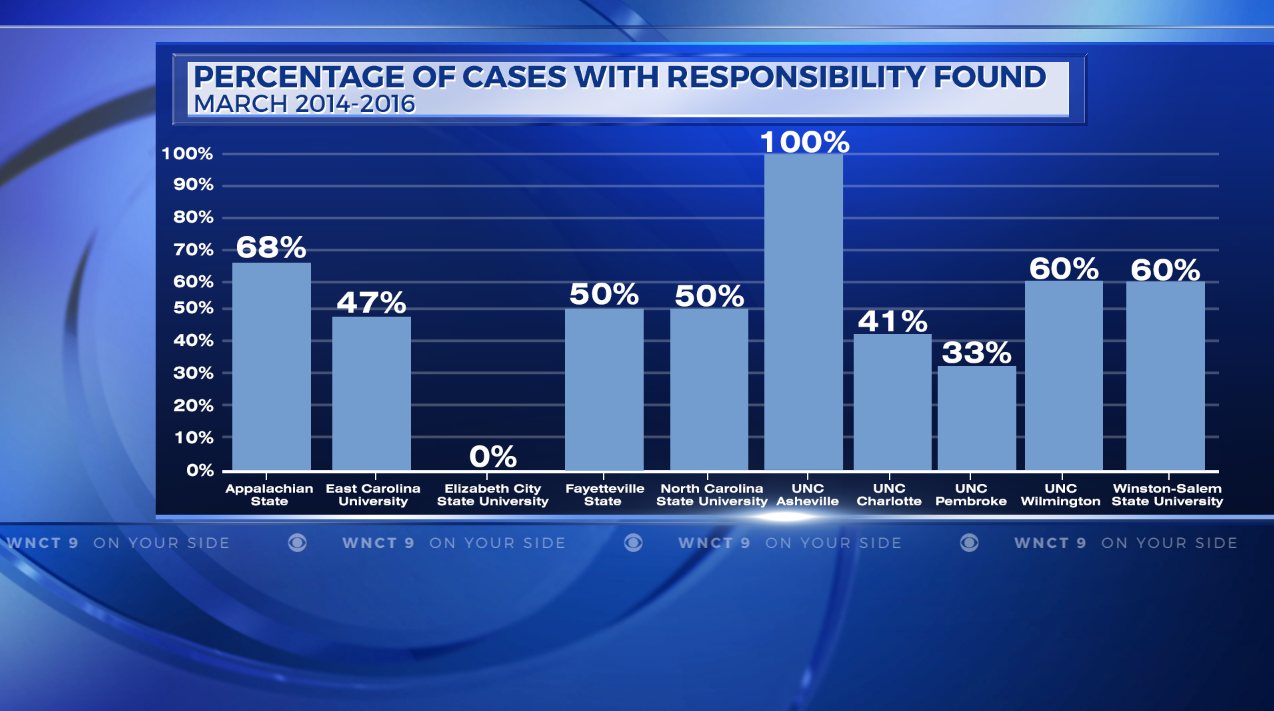GREENVILLE, N.C. – The statistics of sexual assault on college campuses are startling. The National Sexual Violence Resource Center now estimates one in five women, and one in 16 men will be sexually assaulted during college.
In North Carolina, college campuses aren’t immune from the growing problems.
The complaints brought forward are filed under Title IX, which covers a wide array of subjects but includes sexual violence and harassment.
WNCT’s Josh Birch started an investigation into how colleges handled sexual assault cases back in March 2016. The findings of this investigation would surprise some.
Students who report Title IX crimes can either report it to the university, the police, or both.
WNCT went to ECU officials to find out how these cases are handled when reported. Virginia Hardy, ECU’s Vice Chancellor for Student Affairs, said they treat each case separately. They must find a preponderance of evidence with each case to move it forward in the investigation process.
If that evidence isn’t found, the case likely won’t continue forward, unless there is an appeal or new evidence found.
“We’ve gone and we’ve searched to try and get all of the information,” Hardy said. “So if it’s not there, it’s not there.”
From March 2014 until March 2016, more than 110 Title IX complaints were filed at East Carolina University alone. Read the ECU Document
Of those, 23 surpassed the preponderance of evidence standard and therefore led to a formal investigation. The other cases not pursued involved instances where those involved weren’t affiliated with ECU, the complainant couldn’t and wouldn’t identify the respondent, and other various reasons.
Of the 23 cases formally investigated by ECU, 12 resulted in charges being brought forward, with 11 students eventually found responsible for Title IX violations. Punishments for that varied, but generally included suspension or expulsion from the university.
During that two year time period, that means around 47 percent of students formally investigated for Title IX violations were eventually found responsible at ECU.
The numbers weren’t much higher at other UNC School system campuses.
WNCT filed public information request with 15 UNC School System campuses, including UNC-Chapel Hill, which has come under fire recently after Delaney Robinson accused fellow student, and UNC football player, Allen Artis of raping her. Read the UNC Document
“I did not realize that instead of receiving support and concern from the university, I would only be further victimized by the people who should be working to keep us safe,” Robinson said.
Robinson complained UNC wasn’t handling cases properly.
According to records obtained by WNCT, 42 percent of cases formally investigated by UNC between 2012 and 2014 resulted in responsible verdicts. That number rose slightly to 61 percent from 2014 to 2015.
The way universities must handle the cases come down from higher-ups in the school system, as well as the federal government. Robinson argues the system in place isn’t working for victims, but Hardy disagrees at ECU.
“The process works in the regards to we have individuals who are very committed to quality improvement so that they’re getting trained on a regular basis,” Hardy said.
Of the schools WNCT requested information from, UNC Asheville had the highest rates of responsibility being found between March 2014 and March 2016. There, 100 percent of students formally investigated resulted in responsibility being found.
Using those same parameters, that number was 50 percent at NC State, 50 percent at Fayetteville State, 60 percent at UNC Wilmington, 0 percent at Elizabeth City State University, 68 percent at Appalachian State University (where two cases still are pending), and 33 percent at UNC Pembroke.

A more detailed account can be found below:
- NC State – 14 total, 7 responsible (50%)
- Fayetteville State – 8 total, 4 responsible (50%)
- UNC Asheville – 7 total, 7 responsible (100%)
- ECU – 23 investigations, 12 charges, 11 responsible (47%)
- UNC Wilmington – 5 cases, 3 responsible (60%)
- Elizabeth City State University – 3 cases, 0 responsible (0%)
- App State – 25 cases, 17 responsible (two still pending) (68%)
- UNC Charlotte – 22 cases, 9 responsible (four still pending) (41%)
- UNC Pembroke – 15 cases, 5 responsible (33%)
- UNC Chapel Hill – 2012-2014 (19 cases, 8 responsible, 6 pending ) (42%)
- 2014-2015 school year: 18 cases, 11 responsible: (61%)
- Winston-Salem State University – 5 cases, 3 responsible (60%)
Hardy said the reasons why a case wouldn’t move forward vary, from not enough evidence to students not wishing to pursue them further. She said the system must be fair to all those involved.
However, given the percentages of students being found responsible being so low, WNCT went to the state’s top prosecutor, Attorney General Roy Cooper, to ask if he is worried.
“Are you afraid that because of the responsibility rates being so low, that victims are just going to choose not to go through that process and not to open up that wound over and over again if responsibility is never found anyway,” asked WNCT’s Josh Birch.
“What we have to do is make sure that the system is in place so it does encourage them to come forward,” Cooper responded.



